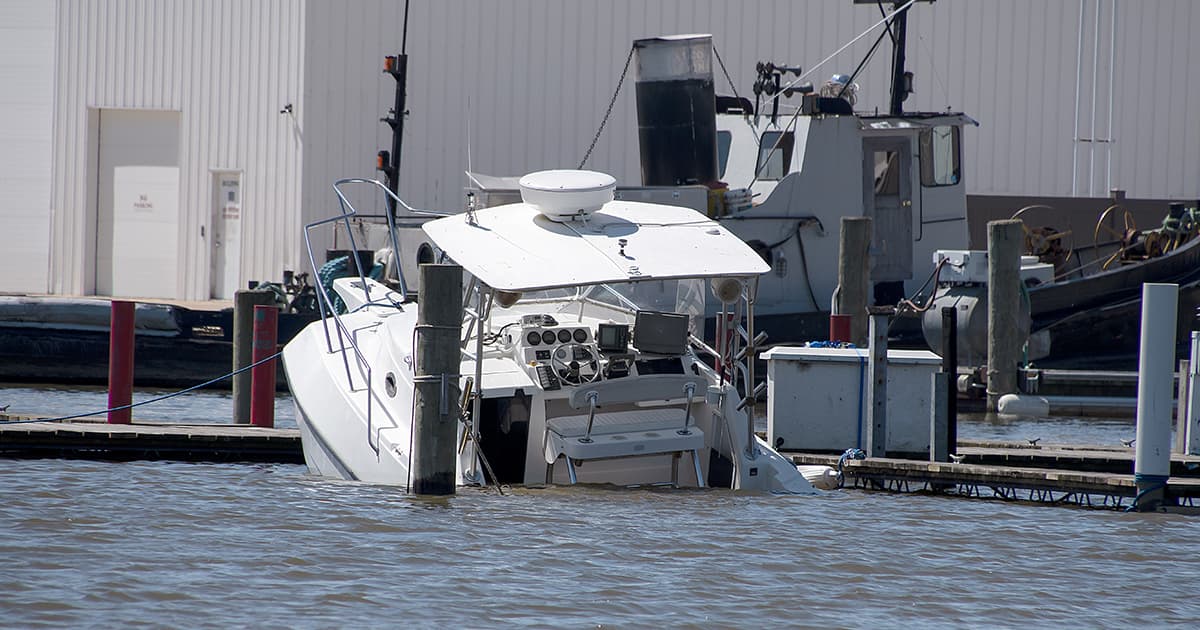
What Are the Most Common Boat Insurance Claims?

Accidents can happen with your boat and they’re more common than you think. Typically, there are five common boating insurance claims.
Here are tips to avoid the top boating insurance claims.
- Top Claim #1 -- Hitting an object
One of the top boating insurance claims is damage caused by hitting floating or submerged objects in the water, such as logs, rocks, and other debris, often in shallow water and in low visibility conditions.
Hitting an object can cause minor damage, but it can also cause damage to your boat’s hull, propellers, mechanical failure, or possibly sinking.
How to prevent hitting an object with your boat
Know the waterway that you are on by using a navigation chart and depth finder.
Be cautious in unfamiliar water and slow down your speed.
You need to obey the marked navigational aids and buoys, which are specifically placed to warn boaters about potential hazards.
Make sure to maintain your boat’s navigational system if it has one.
Take someone with you when you are boating to be on the lookout for debris and other objects, especially if you are in unfamiliar water.
- Top Claim #2 – Theft out of water
How do you store your boat out of the water? Do you have any security measures in place?
Theft can happen when your boat is on its trailer and left sitting in a driveway, for example. A thief could steal from your boat or hitch it up and drive away with it.
How to prevent theft out of water
Remove any valuables from your boat.
If you’re keeping your boat at home instead of at a secure facility: Block your boat trailer with another vehicle in your driveway. Detach outboard engines and store them separately.
Install lighting, motion detectors, and an alarm system. Put a good-quality lock on your trailer. Install a GPS tracking device.
You can also take the hitch off, if possible.
Keep a list of what is being stored on your boat to make it easier for you to know what is missing.
- Top Claim #3 – Weather-related damage
Weather-related damage typically happens when boats are in severe weather conditions such as hurricanes, torrential rain, strong winds, or lightning.
Severe weather can lead to a variety of damages ranging from minor to cracked windshields caused by high winds, water seepage due to heavy rain, or even destruction in cases like a hurricane.
How to prevent weather-related damage
Check your local forecast before going out on the water, including wind speeds, wave height, and any signs of storms.
If you know that a storm is coming, make sure your boat is secured and covered.
during the off-season, you must protect your boat during the cold Canadian winters. Here are some situations that could lead to damage and insurance claims:
Protect your boat during winter: If you don’t protect your boat with a quality cover, snow and ice can accumulate and water can pool inside your boat, causing damage and potential mould growth.
Draining the engine of water: Frozen or cracked engine blocks can happen. To prevent this, after draining, add antifreeze.
Do not store your boat in the water: When water freezes around a boat left in the water, the ice can grind against the hull and even crack and sink it. Your boat must be stored on dry land to avoid this.
- Top Claim #4 – Collisions
Your boat can collide with other boats, the shoreline, or docks and buoys and can cause major damage and potentially life-threatening injuries.
These types of accidents can result from inexperience, lack of attention, alcohol or drug-related impairment, excess speed, poor judgment, or poor visibility.
How to prevent collisions:
It’s important to always prioritize safety. Be aware of your surroundings.
Do not speed and keep a safe distance from other boats. Be aware of the weather. Identify any objects in the water that your boat could hit.
Make sure that your boat is in good repair.
Take a boating safety course. Install navigational aids.
- Top Claim #5 – Damage from the dock
It can happen due to strong winds, a miscalculation of how close you are to the dock, or excess speed.
If you hit the dock, damage from the dock can be minor but it can also cause a hole in the hull or other structural damage, or a bent propeller.
How to prevent dock damage:
Use bumpers or fenders to absorb the impact.
Practice your docking skills on a calm day.
Use a boat cover at your storage facility to cushion any movement.
It’s important to note: Sinking is also a common boat claim and it’s catastrophic. Your boat can sink due to severe weather, striking an underwater object, equipment failure, or neglect.
When a boat sinks, there can be pollution caused by fuel or oil leakage into the water. This can lead to hefty penalties and clean-up costs on top of the loss of your boat.
If you need to make a boat insurance claim: Contact your insurance provider and report the details of the incident. Quickly reporting the incident helps get the claims process going right away.
Keep in mind that most boat insurance policies have a deductible. That’s the amount you will need to pay out of your pocket before the insurance settlement kicks in. The deductible is typically subtracted from the settlement amount.
Also important to know:
Actual cash value vs. agreed value coverage
Actual cash coverage covers you for the value of your boat at the time of loss, not when you bought it.
An agreed value policy honours the value of your boat at the time the policy was written.
Speak to a Western Financial Group boat insurance expert boating insurance needs.
Categories: News

